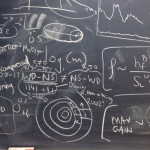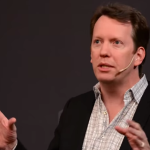Nothing’s the Matter with Atheistic Materialism
by Joe Heschmeyer
Filed under Atheism
The central problem with atheistic materialism is nothing, really. Metaphysical nothing, to be exact.
Any worldview, including atheism, should be able to give some sort of coherent answer to the rudimentary question of why the universe exists. I don't mean “why does this universe exist rather than another?” I mean, “why does there exist anything, rather than nothing?”
Dr. Victor Stenger, in a recent Huffington Post piece on how to debate religion, claims to have an answer. It turns out to be the standard materialist response given by many atheist scientists:
How can something come from nothing?
"Nothing" is notoriously difficult to define. To define it you have to give it some property. But then if it has a property it is not "nothing." So this is an incoherent question unless you define nothing as an empty vacuum.
There are several reasons why this answer is wrong, even incoherent and self-refuting:
Reason #1: Vacuum States Are Something, Not Nothing
The first reason his answer fails is because a vacuum is something, not nothing. We speak of it like it's nothing, just as I might say that there exists nothing in the space between Mercury and Venus, or that there's nothing in my glass after I drained it.
But in all of these cases, we're using “nothing” loosely. Obviously, there's air in my “empty” glass, and there's radiation, light, gravity, and such travelling through “empty” space. It also possesses dimensonality, which nothingness can't. We can say that there are nearly 60 million kilometers of empty space between the sun and Mercury. If empty space were nothing, it would be incoherent (and impossible) to quantify it spatially.
Likewise, vacuums are something: namely, they are physical states that periodically contain matter, and are not completely empty voids:
"Although the average value of a field in a particular region may indeed be zero, quantum theory predicts that there will be fluctuations around this zero value. Each fluctuation signiies the brief appearance of a 'virtual' particle. Hence, even in a true vacuum, matter fields may appear briefly. Even if the matter fields involved in the vacuum state are rather peculiar and certainly not observable in the sense that 'real' particles are, it is a mistake to think of any physical vacuum as some absolutely empty 'void.'"
Of course, even if they were completely empty voids, in the sense of lacking any particles, they would still exist, possessing width, breadth, and length, etc. So we can imagine something more empty than a vacuum state, and even that would be something, not nothing.
Stenger claimed that the only coherent way to understand nothing is as “an empty vacuum.” Of course, for a vacuum to be described as empty, it must first exist, and therefore, be something. This is easily illustrated by visualizing two people: one has an empty bag, while the other one doesn't have a bag. Which of these people has nothing?
This is similar to the analogy that the physicist Stephen Barr uses to explain the difference between a vacuum state and metaphysical nothing:
"An analogy may help here. A checking account is a system that has many possible states: the zero-dollar state, the thousand-dollar state, the negative-thousand-dollar state (if one is overdrawn), the million-dollar state, etc. And this system can make transitions from one state to another. For instance, by a finance charge or by accruing interest. Even if your checking account happens to be in the zero-dollar state one day, the checking account is nevertheless still something definite and real, not 'nothing.' It presupposes a bank, a monetary system, a contract between you and that bank, all being governed by various systems of rules.
Imagine the day on which your bank account balance is zero. Then imagine a deposit the next day that raises it to one thousand dollars. A quantum theory of the creation of a universe (in Hawking’s version, or Vilenkin’s, or anyone else’s) is akin to this transition from an empty account to one full of money. Obviously, therefore, the “nothing” that Hawking makes part of his theory of the creation of our universe is not nothing in a metaphysical sense. The “no-universe” of his speculations is like the “no-dollars” in my account. It exists within the framework of a complex overarching system with specific rules. So we can see that, if true, the way of thinking put forward by Hawking does not threaten the classical doctrine of creation out of nothing."
Here's another way of thinking about this: imagine that tomorrow, scientists (somehow) discovered another universe that was only a quantum vacuum. They would excitedly announce that they had discovered something, and they would be right. They would have discovered something: namely, a universe whose existence we would have to account for somehow.
This is the most glaring problem with Stenger's answer (and the answer given by most other atheist materialists). But there are other problems, too:
Reason #2: When We Say “Nothing,” We Don't Mean “Vacuum States"
There is a related, but more fundamental problem with Stenger's answer: it isn't responsive to the question asked. If I asked you what a rock eats, you would rightly answer “nothing.” And you wouldn't mean that rocks eat vacuum states. You would mean that they eat nothing, that they don't eat. If I asked what you know about quantum mechanics, and you said “nothing,” you wouldn't mean that you know all about vacuum states. For that matter, when Stenger says “Nothing like this has ever happened,” he isn't talking about empty vacuums.
In all of these cases, we see that we can meaningfully speak about “nothing” without referring to vacuums. So when Stenger claims that it “is an incoherent question unless you define nothing as an empty vacuum,” the most charitable thing that can be said is that he has no idea what he's talking about.
Stenger is simply changing the question. He's asked how the materialist can get from utter, metaphysical, non-existence to a universe. He doesn't answer this. Instead, he changes it to an argument about whether matter can appear within a quantum state (inside of an already-existing, empty universe). But these aren't even remotely the same question.
It's clear why he wants to shift the debate: Stenger, a physicist, seems to know very little about philosophy (or history, but that's a matter for another day), so he's simply redefined the question to make it about physics. But the actual question isn't a question about physics, but about something more basic: metaphysics. A related question would be: how and why is there a universe that physics can study? Obviously, that's not a question that physics can answer, since physics necessarily assumes the prior existence of this universe in order to operate.
Reason #3: Stenger's Answer Renders Materialism Incoherent
Stenger is a materialist, and he's giving a classic materialist (non-)answer to the problem of “nothing.” But to see the absurdity of this question, I wish someone would ask him: “what exists besides the material world?” Just imagine the dialogue:
What exists beside the material world?
Nothing.
Oh, a vacuum?
Since a vacuum is part of the material universe, this answer would be equivalent to saying, “outside of my house is the rest of the inside of my house.” In other words: utter incoherent. It would also be a refutation of materialism, to the extent that he would have to affirm that in addition to the material world, there are also vacuums that somehow exist immaterially.
And of course, if he have any other answer—if he said that there exists something other than the material world—then he would also be rejecting materialism. So you can see why understanding “nothing” as “an empty vacuum” is nonsensical, right?
Reason #4: The Materialist Approach to Nothing is Anti-Scientific
Stenger isn't the only physicist with a problem with “nothing.” Neil deGrasse Tyson hosted a debate on nothing last year, and none of the participants were able to come up with a suitable definition. The philosopher Jim Holt pointed out that if you equate “nothing” with “lacking matter,” this would mean that mathematics, physical laws, and consciousness are nothing.
Stenger seems dimly aware of the problem of rectifying his materialism with the existence of mathematics, but his answer is that “Logic and mathematics are exhibited by particles of graphite or ink on paper, or particles of chalk on a blackboard.” Even if that were true (which, of course, it's not), it wouldn't save his position, since mathematical truths exist prior to being discovered or exhibited. Otherwise, he'd have to conclude that mathematicians somehow make 2 plus 2 equal 4, rather than discovering that it does.
The Deeper Problem: Atheistic Materialism v. Science
The fourth reason I mentioned points to a broader problem: atheistic materialism is deeply anti-scientific. Later, in the same piece, Stenger dodges the question “Where did the laws of physics come from?” by saying:
"What we call the "laws" of physics are not something inherent in the universe. They are not commandments that material objects must obey. They are principles that physicists build into models to describe their observations. We should not assume that any of the ingredients in the models of physics correspond one-to-one with actual objects of ultimate reality. Of course, they must have something to do with reality to agree with observations. But we have no way of knowing exactly what that something is, so we waste our time arguing about it."
In other words, if he can deny that the laws (or “laws”) of physics are actually true, he doesn't have to explain where they come from, or why they exist (a question that physics, by definition, can't answer). But he can't actually deny that the laws of physics are true, or he would undermine his own authority as a physicist. So we end up with this mishmash, instead: the laws sort of correspond to reality, and sort of don't.
Of course, this still suggests that reality behaves in some sort of mathematical and ordered way (or physics wouldn't work, and wouldn't correspond to reality at all). And of course, he's failed to give any answer to why the universe would be behave in such a mathematical and ordered way, other than to claim that we're wasting our time asking questions that he can't answer.
I'm reminded of the biologist Richard Lewontin, who candidly admitted that he and other scientists accepted materialism in spite of the evidence, rather than because of it, simply to avoid any reference or need for God:
"Our willingness to accept scientific claims that are against common sense is the key to an understanding of the real struggle between science and the supernatural. We take the side of science in spite of the patent absurdity of some of its constructs, in spite of its failure to fulfill many of its extravagant promises of health and life, in spite of the tolerance of the scientific community for unsubstantiated just-so stories, because we have a prior commitment, a commitment to materialism.
It is not that the methods and institutions of science somehow compel us to accept a material explanation of the phenomenal world, but, on the contrary, that we are forced by our a priori adherence to material causes to create an apparatus of investigation and a set of concepts that produce material explanations, no matter how counter-intuitive, no matter how mystifying to the uninitiated. Moreover, that materialism is absolute, for we cannot allow a Divine Foot in the door."
The debate is often presented, even by Lewontin, as a feud between science and religion. That's not the case: rather, atheistic materialism undermines science as much as it does religion.
If you believe in God, then you can give a coherent account of why there exists something, rather than nothing, and you can explain why that something is ordered and coherent. That gives you the foundation upon which to do real science (which is why, as a matter of historical fact, modern science was born in Catholic universities and monasteries, and why most of the finest institutions around the world were founded by religious groups). If you reject this foundation, you risk ending up in Stenger's incoherence, undermining the truth of mathematics, denying the truth of the laws of physics, and incapable of answering why the universe exists.
Related Posts
Note: Our goal is to cultivate serious and respectful dialogue. While it's OK to disagree—even encouraged!—any snarky, offensive, or off-topic comments will be deleted. Before commenting please read the Commenting Rules and Tips. If you're having trouble commenting, read the Commenting Instructions.













